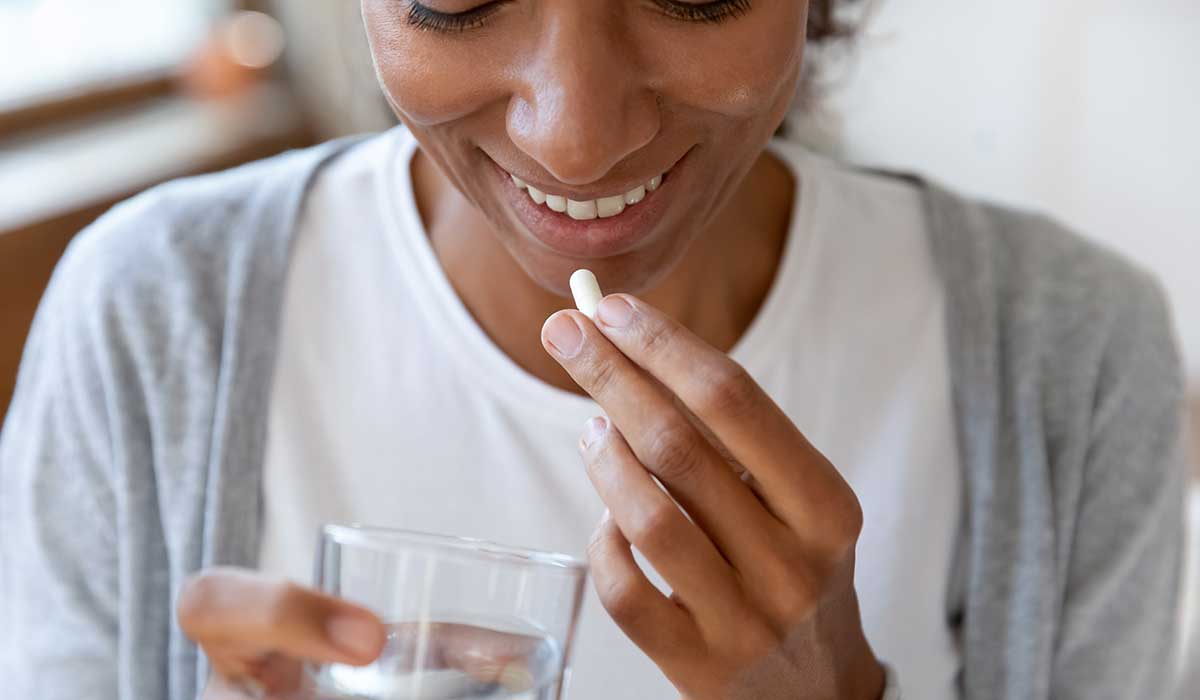Have you ever asked yourself, “Why is my skin so dry even when I moisturize?” Dry skin is a common and relentless problem, leaving us feeling uncomfortable and self-conscious. But fear not as the solution to this annoying skin condition might be closer than you imagine. In this comprehensive guide, we’ll delve into the world of skincare through the use of at-home vitamin deficiency testing and explore the best vitamins and dry skin supplements for treating and managing dry skin.

Understanding Dry Skin [1]
Dry skin occurs when the skin lacks sufficient moisture and oils, leading to itchiness, flakiness, and irritation. In addition, dry skin and a compromised skin barrier often go hand in hand, creating a cycle of discomfort and vulnerability for individuals experiencing these conditions. The skin barrier, a.k.a., the stratum corneum, serves as the body’s outermost layer of skin and plays a critical role in maintaining hydration, regulating temperature, and protecting against external aggressors such as bacteria, pollutants, and irritants.
When the skin barrier becomes compromised, i.e., damaged, its ability to retain moisture is diminished, leading to dryness and dehydration. Several factors can contribute to a compromised skin barrier, including harsh weather conditions, excessive cleansing, overuse of skincare products, and underlying skin conditions such as eczema and psoriasis. These factors disrupt the skin’s lipid (oil) barrier which consists of ceramides, fatty acids, and cholesterol, essential for sealing in moisture and maintaining skin suppleness.
As the skin barrier weakens, moisture loss accelerates, further exacerbating dryness and discomfort. Without proper hydration, the skin’s protective function is compromised, making it more susceptible to irritants and allergens. This can trigger inflammatory responses leading to redness, itching, and sensitivity. Additionally, a compromised skin barrier allows for greater trans-epidermal water loss (TEWL), further exacerbating dryness and perpetuating the cycle of skin barrier dysfunction.
Moreover, a compromised skin barrier can impact the skin’s ability to repair and regenerate itself, prolonging the duration of dry skin symptoms. Without intervention, this cycle of dryness and barrier dysfunction can escalate, leading to chronic skin conditions and increased susceptibility to infection.
Hence, addressing both dry skin and a compromised skin barrier requires a multifaceted approach. This includes replenishing moisture with hydrating skincare products, restoring lipid barrier functionality with ceramide-rich formulations, and minimizing exposure to factors that exacerbate skin barrier damage.
Vitamin Deficiency Tests
Testing for vitamin deficiency offers a way for individuals suffering from dry skin to identify potential underlying causes and then tailor their skincare and dietary regiments accordingly. Dry skin can often be linked to deficiencies in specific vitamins and nutrients such as vitamin A, vitamin C, vitamin D, and vitamin E which play important roles in maintaining skin health and hydration.
By utilizing at-home vitamin deficiency tests, individuals can gain valuable insights into their unique nutritional needs and identify any deficiencies that may be contributing to their dry skin, in a convenient and accessible way. These tests typically involve collecting a small saliva sample and sending it to a CLIA-certified laboratory for analysis. The results provide detailed information about an individual’s vitamin levels, allowing them to pinpoint areas of deficiency and take proactive steps to address them. Hence, for those wondering, “What vitamin are you lacking if you have dry skin?”, an at-home vitamin deficiency test may be just the scientific, biotech-based crystal ball you’ve been looking for!
Once deficiencies are identified, individuals can take targeted actions to replenish their vitamin levels to improve their skin health. This can involve incorporating vitamin-rich foods into their diet or taking dietary supplements to fill any nutritional gaps. In addition, individuals can adjust their skincare routines to include products containing specific vitamins known to benefit dry skin such as moisturizers enriched with vitamin E or serums infused with vitamin C.
Vitamin A [2]
Vitamin A plays a crucial role in promoting skin health by supporting various physiological processes essential for promoting cell skin regeneration. As an antioxidant, vitamin A helps neutralize free radicals to protect the skin from oxidative stress, thereby reducing inflammation in, and premature aging of, the skin. Additionally, vitamin A regulates cell turnover, promoting the shedding of old, damaged skin cells and facilitating the growth of new, healthy skin cells.
This process not only helps maintain skin texture and tone, but also aids in the repair of a compromised (damaged) skin barrier, making it particularly beneficial for individuals with dry, flaky skin, a result of skin barrier damage. Moreover, vitamin A also supports the production of collagen and elastin, proteins crucial for maintaining skin elasticity and firmness. Not having enough vitamin A can lead to dry, rough skin and may trigger the development of eczema.
Vitamin C [3]
Vitamin C provides essential support for individuals battling dry skin by aiding in collagen synthesis, a process crucial for maintaining skin elasticity and hydration. By stimulating collagen production vitamin C helps counter the body’s natural decline in production capacity as we age.
In addition to its role in collagen synthesis, vitamin C is also highly effective at protecting the skin from external environmental aggressors like UV radiation and pollutants. Because it is a potent antioxidant, vitamin C helps neutralize free radicals present in/on the skin, thereby protecting the skin barrier from becoming compromised which causes moisture loss and leads to the development of dry, flaky, sensitive skin.
Vitamin D [4]
Vitamin D deficiency can significantly impact the health and appearance of the skin, often exacerbating dryness and related symptoms. As a crucial nutrient involved in various physiological processes, including skin cell growth and repair, vitamin D plays a vital role in maintaining skin barrier function and hydration levels. When levels of vitamin D decrease, the skin’s ability to retain moisture and regulate its lipid (oil) barrier becomes compromised, leading to increased trans-epidermal water loss (TEWL) and dehydration.
Moreover, vitamin D deficiency has been associated with inflammatory skin conditions such as eczema (atopic dermatitis) and psoriasis, which oftentimes manifest as dry, itchy, and flaky skin. These conditions can worsen dryness and further disrupt the skin barrier creating a vicious cycle of skin inflammation and moisture loss. As a result, addressing vitamin D deficiency through supplementation or increased sun exposure, in conjunction with proper skincare regimens, is essential for restoring skin health and alleviating dry skin symptoms.
Vitamin E [5]
Here too, as a powerful antioxidant, vitamin E plays a crucial role in protecting the skin barrier’s lipid (oil) portion from oxidative stress and damage caused by free radicals formed in/on the skin due to daily exposure to UV radiation and air pollutants. Specifically, vitamin E aids in the preservation of essential lipids like ceramides and fatty acids within the skin barrier. These lipids are critically important for sealing in moisture and maintaining hydration levels, thereby preventing excessive dryness and promoting overall skin health.
All the above-mentioned vitamins can be sourced from foods known to contain these vitamins like citrus fruits high in vitamin C. However, for those of us who find it challenging at times to regularly eat such foods and might be asking “What supplements stop dry skin?”, the good news is that all these vitamins are available in supplement form!
Tips For Managing Dry Skin
Managing dry skin effectively requires a holistic approach that encompasses both internal and external factors. In addition to incorporating vitamins and supplements into your daily routine, here are some additional practical tips to help alleviate dryness and promote skin health:
- Stay Hydrated: Ensure adequate hydration by drinking plenty of water throughout the day. Hydration from within is essential for maintaining skin moisture levels and supporting overall skin health.
- Gentle Cleansing: Use a mild, non-irritating cleanser to cleanse your skin without stripping away its natural oils. Avoid hot showers and baths as prolonged exposure to hot water can further strip moisture from your skin.
- Moisturize Regularly: Apply a nourishing moisturizer to damp skin, especially after bathing, to lock in moisture and prevent dryness. Look for moisturizers containing ingredients such as hyaluronic acid, glycerin, and ceramides to hydrate and repair the skin barrier.
- Outdoor Protection: Protect your skin from harsh environmental factors like wind and cold weather due to their likelihood to further exacerbate dryness and irritation. Consider wearing protective clothing and using a barrier cream to shield your skin from the elements.
- Humidify the Air: Consider using a humidifier to add moisture to the air, especially during dry winter months when indoor heating can further dehydrate the skin. Humidifiers help maintain optimal humidity levels, preventing moisture loss and promoting skin hydration.
And for those wondering, “What happens if you put too much moisturizer on dry skin?”, it can be problematic. Over-moisturization can lead to clogged pores, acne breakouts, formation of tiny rash-like bumps, and irregular sebum (oil) production which, believe it or not, can further dry out your skin if too little sebum is produced due to excessive moisturization. Always remember, too much of even a good thing can be bad for you!
If you’re struggling to identify the root cause of your dry skin, you should really consider the DECODE.MYHEALTH® VITAMIN DNA TEST, a biotech-based analysis tool in Codex Labs’ precision skin health tool kit, to unlock the biological reasons behind your body’s dry skin tendencies. This innovative tool is designed to analyze your genetic predisposition towards dry skin, providing valuable insights into YOUR skin’s unique needs. And it comes with a free consultation with a healthcare professional to help you decipher your results so you can make informed decisions on how to better care for your unique skin.
So, if you’re wondering, “What do dermatologists recommend for extremely dry skin?”, the answer is it depends on your skin’s unique genetic makeup since not everyone’s skin is created equal. By understanding your skin’s unique genetic profile, you can tailor your skincare routine with targeted, precise solutions for optimal results and say goodbye to dry, uncomfortable skin, while unlocking the secrets to radiant, healthy skin with your skincare BFF, Codex Labs®.
Conclusion
Don’t let dry skin undermine your confidence. With the right vitamins, supplements, diet, and skincare practices, you can restore moisture and vitality to your skin. Remember to nourish your skin from the inside out and seek personalized, precise skincare solutions through DNA testing for unparalleled results. Embrace the journey to healthier, happier skin, starting today. Why? Because your skin deserves it!
References:
- https://www.healthline.com/health/skin-barrier
- https://www.webmd.com/vitamins-and-supplements/what-is-vitamin-a-deficiency
- https://www.webmd.com/vitamins-and-supplements/ss/slideshow-vitamin-c-deficiency
- https://www.ncbi.nlm.nih.gov/pmc/articles/PMC3475231/
- https://www.ncbi.nlm.nih.gov/pmc/articles/PMC8670689/

